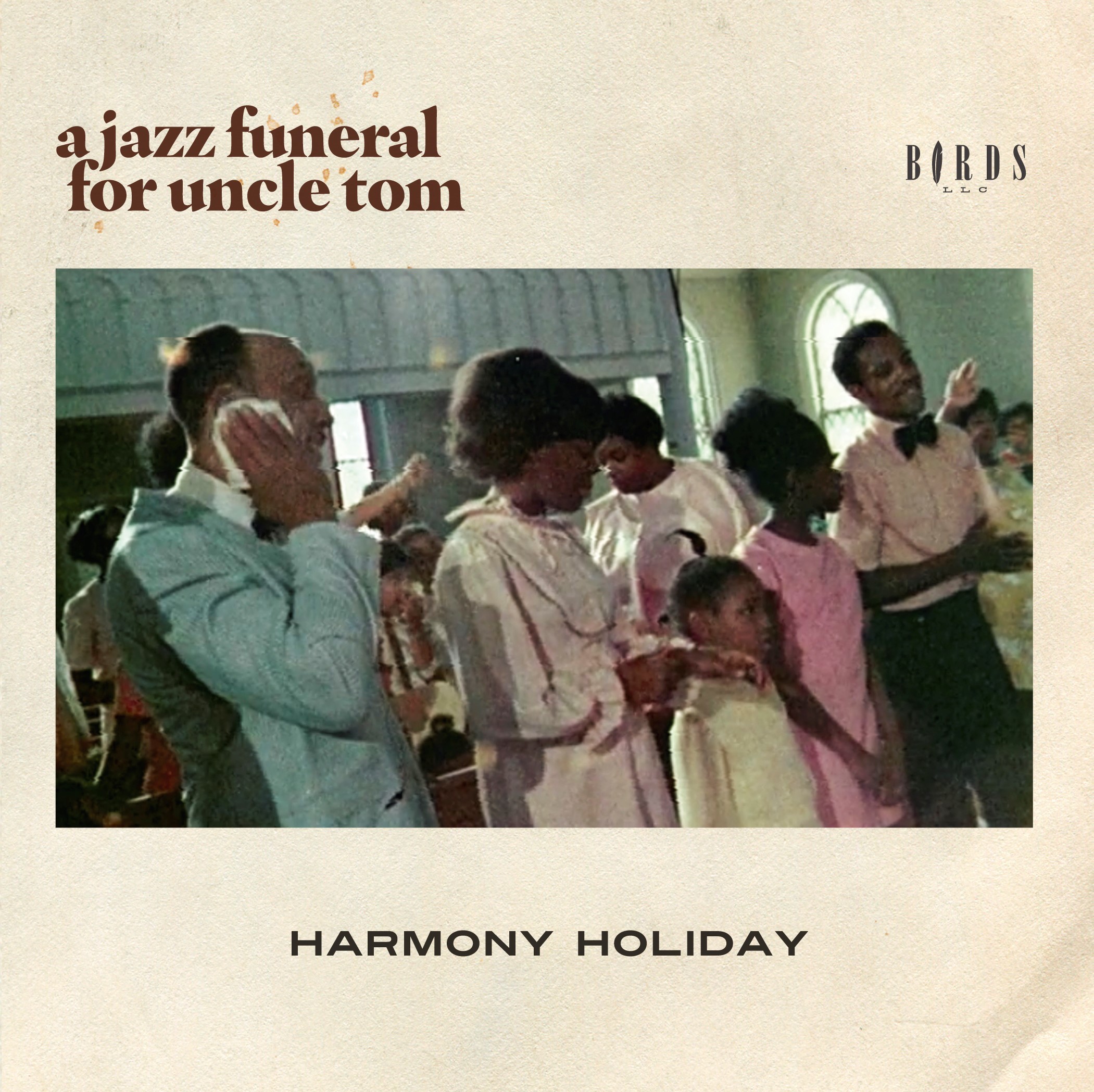

A Jazz Funeral for Uncle Tom
Harmony Holiday
🌟 Winner of a 2020 California Book Award
UNCLE TOM, AMERICA'S FAVORITE NEGRO, IS DEAD
Championing the tenderest of homicidal tendencies, a penchant for mercy killings and redemptive rites of passage, A Jazz Funeral for Uncle Tom is exactly what it announces it is, a book as dynamic and eternal event wherein a feminine voice leads her band of improvisers in a procession of joyous interrogation and forgiveness. This ritural is simultaneously a purging of any cowardly impulses in the speaker and in the culture she addresses and speaks as, and a releasing or banishing of unfit archetypes, readying the landscape for fresh forces by torching the weakest links in the prevailing mythos.
This book looks at the current state of the double and triple consciousness blackness in the West demands and situates its varied states and registers as chorus, as music, and call and response. In this way the book performs and reinvents a ritual, the Jazz Funeral, while offering a new perspective on letting go and rebirth cycles, a new path from bereavement to reprieve. Self-actualization is not only inevitable but fun in the context of A Jazz Funeral for Uncle Tom. We learn how he got over, how she got over, how a song of innocence turns into a mandate for the total renewal of the souls of black folk, and therefore of everyone— and we are given a songbook that assists in the releasing modes of existence we have outgrown, and let’s us enjoy the process.
Inside the Book
- Category:
- Poetry
- Binding:
- Perfect Bound
- Dimensions
- 7" x 7"
- Publication Date:
- July 2019
- ISBN:
- 978-0-9914298-9-9
Watch the Trailer
Reviews
- Publishers’ Weekly Starred Review
- GQ
- Lit Hub
- Electric Lit
From the Book
Obituary for Uncle Tom
The same man who allowed Zora Neale Hurston to die in a welfare home after she spent her final years working as a maid for a white woman despite having devoted her life to diligently collecting all of the grunts and snorts, shrills and moans of his stupefied condition, in the fields, on the corner, at the counter, from the ceremony, to the hound den, the same man who found his own voice so pretentious he only whispered or screamed, couldn’t work the middle, has passed into the next part of his journey, died in his sleep while on a plan feeling to Paris.
Uncle Tom was born into slavery but earned his freedom dancing as a stripper for his white slave mistresses, they offered tips and pet his head until he felt as ready as a beast or an adulterer for his nightwalks. Freed, he moved to Eatonville and later to Chicago then Boston, where he made his living as a tailor by day though he never stopped selling to the white women, it was a bit more dangerous for a free man than it was for a slave, to be touched by the other race. Sometimes he missed the certainty of the whip, and he often beat his wife Julia with the good leather belt hehad lifted from a deceased customer. That felt healthy and as close to love as he’d ever be, beating the black off the mother of his seven children. Uncle Tom had wanted to be a good man, the best kind of man, a faithful, deliberate, and always home on time kind, but he lost track of who and what to be faithful to and self disappeared in the losing of that. Mirrors were cruel and ever wide and descriptive of a bible and a broken field hand hiding in the scripted factory.
Uncle Tom became a rapper after his first son ran away to live back in South where the cotton crumbled into women who could cook grits and shoot guns. He felt something stolen that only language could return or demand in currency. He felt like a stowaway in a bang up song and wanted to rewrite his hunted lingering. Uncle Tom became everything he thought about and he thought a lot about a house, about a stethoscope, about the road, about the joke in the song that became that hook that he then hung from, clapping.
Uncle Tom was ridiculous, the greatest pretender. He couldn’t disagree with anyone, he never knew Duke Ellington from Monk from Andrew Hill from Cousin Mary, he didn’t want to recognize any difference between souls, and as bitter as this futile refusal made him, he smiled and tamed his will to recoil into a position on the lantern’s edge. Watchman. Sellout. He had so many disguises and all the cadillacs and pinstripes to match. A couple cardigans, hard dimples and soft socks, shamrock and ciroc. Free Meek Mill. Free the people, free the land. We mean it. And Mumia, and the mummies stolen from egypt and on display in some museum in England.
Uncle Tom is a burning wish; he is a wish that burns eternal. He is a songbook purged through rehearsal, one who must be practiced to be destroyed, loved into uselessness, and then at last, gone.